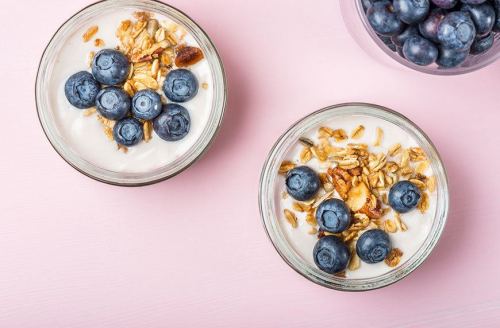Kombucha’s popularity has skyrocketed since the ’90s. No longer is it just for the scoby-sharing home brewers: This tangy, lightly effervescent beverage can be found in the fridge at nearly every supermarket (not to mention the taps of cafes, coworking spaces, and breweries) across the country.
Experts in This Article
registered dietitian
Chances are, you’ve heard that kombucha boasts an impressive amount of gut health perks—but does that actually check out? Here’s what the science tells us about kombucha benefits.
What is kombucha?
First things first. Kombucha, if you’re new to the drink, is a fermented tea that has roots dating back nearly 2,000 years ago in China. It’s made through combining tea, yeast, bacteria, and sugar. The sugar acts as food for the yeast and bacteria, driving the fermentation process. (Fermentation is a metabolic process that produces changes in a food or beverage on a cellular level, such as improved taste, health benefits, or increased shelf life.)
Oftentimes, especially if the beverage is made at home, kombucha will start with what is called a “mother,” or a SCOBY (short for symbiotic culture of bacteria and yeast). SCOBYs are thriving cultures of bacteria and yeast that will facilitate the process of turning sweetened tea into a fermented beverage within seven to 30 days.
The key ways that kombucha benefits your health
So, what kind of health benefits can we expect from our glass bottles of kombucha (with those beautiful, highly-stylized logos)? Thanks to the fermentation process, kombucha will offer us healthy bacteria, or probiotics.
Probiotics feed your gut microbiome by boosting its beneficial bacteria population. Your gut microbiome, in turn, helps to improve digestion and metabolism—but it’s also been linked with benefits to nearly every body system. From brain health to the expression (or lack thereof) of chronic illnesses like rheumatoid arthritis, asthma, type 2 diabetes, inflammatory bowel disease, irritable bowel syndrome, heart disease, liver disease, and kidney disease, there’s little that the gut microbiome doesn’t do in the body. Plus, probiotics boost our immune system with their natural antioxidant, anti-inflammatory, anti-microbial, and antifungal properties.
Kombucha also contains quite a few B vitamins including B6, B12, thiamin, riboflavin, niacin, and folate. B vitamins are vital for proper energy metabolism and ensure that our cells function properly.
And similar to many vinegars, kombucha contains acetic acid, which you might be able to pick up on just based on its taste. Acetic acid provides antimicrobial benefits, helps to regulate blood pressure, and has even been shown to improve cardiovascular function and blood sugar regulation.
Seeing as kombucha is made from tea, it also carries the same benefits as this popular coffee alternative. Tea is notably high in plant compounds, especially EGCG (epigallocatechin gallate), kaempferol, and quercetin. These compounds are super effective antioxidants that help to reduce inflammation and fight off free radicals, the culprits of many chronic diseases.
Finally, many kombucha enthusiasts also claim that it can prevent heart disease, a number of cancers, and promote liver function. However, many of these claims are based on animal studies and the general consensus in the scientific community is that further research is needed to fully make these conclusions for humans.
Are there any drawbacks to drinking kombucha?
While the many kombucha benefits we’ve highlighted about sound enticing thus far, there is a little bit more to the story. Depending on the brand of kombucha you purchase, the sugar content can vary anywhere from four to 12 grams per eight ounces. Considering that the generally accepted added sugar recommendation is no more than 25 to 35 grams per day, this is certainly not insignificant. Added sugar is a major proinflammatory agent and excessive consumption can lead to increased blood pressure, anxiety, and predisposes us to chronic illnesses like type 2 diabetes and liver disease.
Thanks to the Food and Drug Administration (FDA) labeling laws, the number of healthy organisms in a bottle of kombucha should be accurate. However, to meet those standards, many brands add in at least some of those organisms after fermentation has already occurred. So while they can still be beneficial to us, they aren’t a product of the fermentation process. Plus, we don’t know how many of those cultures are still alive at time of purchase…or at time of consumption.
Also, if you’re trying to steer clear of caffeine, kombucha may not be the beverage for you, as it does provide some caffeine thanks to the tea it’s made from (though typically in small amounts). Further, because of the acetic acid content in kombucha, it is a lower pH beverage. This translates to its potential to compromise tooth enamel, increasing risk for tooth sensitivity, and discoloration if consumed in large amounts.
All kombucha will contain a small amount of alcohol as a natural by-product of the fermentation process. The brands you’ll find at the retailers will have less than 0.5 percent alcohol by volume (ABV) as mandated by the Alcohol and Tobacco Tax and Trade Bureau to be sold as a non-alcoholic beverage. This is a number you can typically feel confident in, but there has been some evidence showing otherwise. One 2020 study by the British Columbia Centre for Disease Control tested multiple brands of kombucha, finding that the alcohol content actually ranged anywhere between one and three percent ABV.
Keep in mind: The alcohol content of kombucha is of much greater concern when it’s homemade. With kombucha brewed at home, it’s difficult to tell how much alcohol was created by fermentation, and if any contamination has occurred. If the brew was created without adequate sanitation or even if a small mistake is made in the fermentation process, it can lead to harmful bacteria flourishing in your kombucha, which can be harmful to your health.
Conclusions on kombucha benefits
Overall, enjoying the ‘booch in moderation is at worst, safe and at best, beneficial for your health. We do know that there are some inherent benefits to the beverage associated with the tea it’s made from and the nutrients created in the fermentation process. But evidence has yet to show that kombucha’s benefits really translate into improved health outcomes in humans.
One thing to note is that the relatively high acid content of kombucha can be hard on the stomach initially, so if you’re new to the drink, take it slow. Also, to avoid your kombucha choice being more similar to a soda than a tea-based health beverage, be sure to look at the labels and choose the lowest sugar option. If you have sensitive teeth, try to drink your kombucha in one sitting as opposed to sipping it throughout the day and follow it up with lots of water. Finally, Because of the alcohol content in kombucha, even if low; pregnant people should avoid drinking this fizzy refreshment entirely.
TL’ DR? Seeing as the jury is still out on some of the benefits and potential risks of kombucha, I wouldn’t categorize it as a superfood, cure-all, or must-add to your daily routine—but it can fit into a healthy lifestyle when done so mindfully.
Sign Up for Our Daily Newsletter
Get all the latest in wellness, trends, food, fitness, beauty, and more delivered right to your inbox.
Got it, you've been added to our email list.










